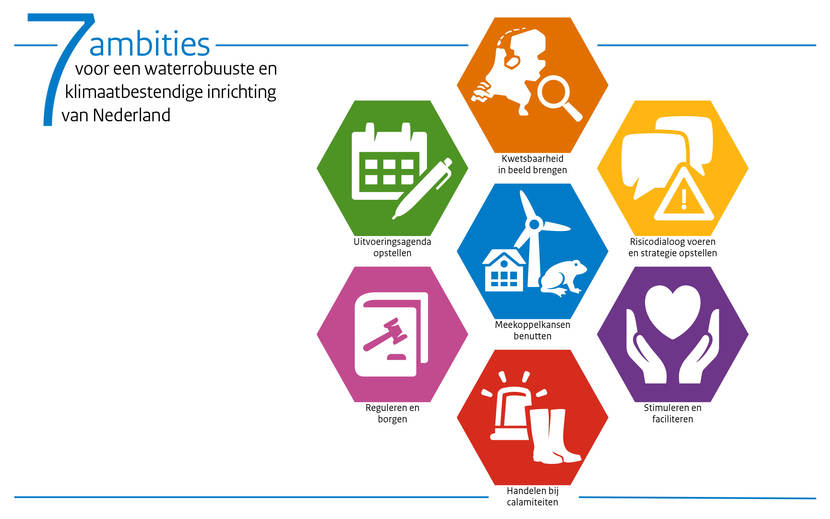Spatial Adaptation working regions ready to go
Over the past year, a nationwide collaboration structure has been developed in the purview of spatial adaptation. Collaboration at the local and regional scale levels is essential to substantiate the seven ambitions of the Delta Plan on Spatial Adaptation. No-one can accomplish this on their own.

Some 40 working regions have already been formed. In a working region, the governments involved collectively commission a stress test to gain insight into the region’s vulnerability to weather extremes, set down their own ambitions and policies, and implement measures as required. All this to ensure the Netherlands’ long-term climate-proofing and water resilience. The working regions differ widely in terms of scope: some cover a province with all its municipalities and district water boards, others involve a single municipality or an existing collaboration within the water chain.
On 17 May, the representatives of all the working regions and Delta Programme Commissioner Wim Kuijken gathered at an initiation meeting in Utrecht in order to discuss the taskings to be tackled by the working regions, and to examine the need for support in their approach. Wim Kuijken underscored the importance of keeping one another up to date in the decades ahead and joining forces when addressing the spatial adaptation tasking, a tasking that is going to permeate into the very capillaries of spatial planning and the water system. ‘It is important to learn from one another and to know what works and what doesn’t,’ the Delta Programme Commissioner stated. ‘Working on spatial adaptation is not some sort of sideline. I consider it the “new way of working”. For example, we no longer replace sewers without factoring in spatial adaptation; area restructuring entails taking account of water.’ In addition to the justified attention to the energy transition, we must also focus attention on climate adaptation at the municipal, provincial, and district water board levels. For example, with respect to the huge construction tasking we are facing. It is important to properly explore optimum locations for new housing estates. Stress tests and the Water Review are useful instruments in this regard.’ The Delta Programme Commissioner called on those present to visit the “Water Street” in the Green Village (at the Delft University of Technology campus), which features a host of innovations in the field of urban water issues, and he concluded by expressing his intention to visit all 40 working regions, starting on Prinsjesdag [the official opening of Parliament in September] and continuing in 2019, in order to promote working on spatial adaptation.
The National Spatial Adaptation Team has commissioned the Climate Adaptation Advisory Team to map out the need for support at 11 locations in the Netherlands. The Advisory Team presented its initial conclusions at the meeting. One of its conclusions is that climate-proofing the Netherlands is not so much a technological issue (“we have plenty of effective measures”) but rather a collaboration issue that is focused, on the one hand, on internal collaboration and organisation within municipalities and district water boards, and on the other, on collaboration and organisation with regional partners.
Several workshops addressed the step from stress test to conducting risk dialogues and deciding on measures in consultation with local residents. Concrete practical examples from Breda and Overijssel were reviewed. The Delta Programme Commissioner was presented with a magazine on four years of “Amsterdam Rainproof”. The final conclusion of the initiation meeting was that a collective gathering of all the working regions holds great value, to learn from one another and to examine where support would be needed. In the near future, a meeting with administrators will be organised in order to embed the Spatial Adaptation community at the administrative level.